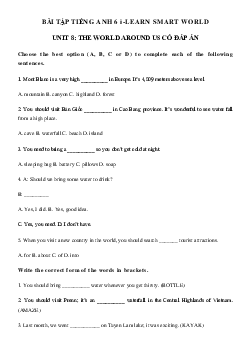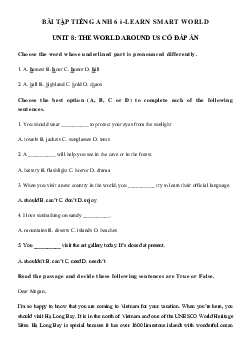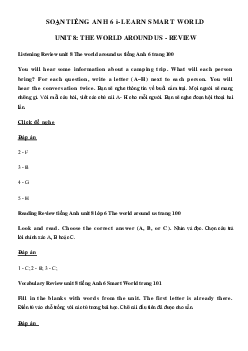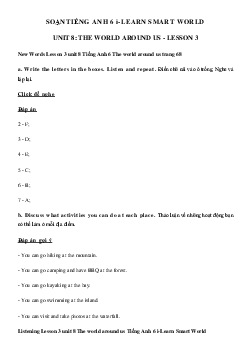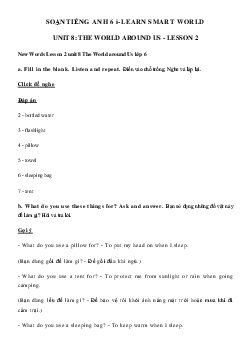



Preview text:
NGỮ PHÁP TIẾNG ANH 6 i-LEARN SMART WORLD
UNIT 8: THE WORLD AROUND US
I. Should/ Shouldn't trong tiếng Anh 1. Cách dùng
- Đưa ra l ời khuyên hay ý ki ến.
You look tired. You should take a rest. Em trông mệt mỏi lắm, em nên nghỉ ngơi đi thôi
- Diễn tả trách nhi ệm và nhi ệm vụ 1 cách lịch sự
You shouldn’t listen to the music in class. Em không được nghe nhạc trong lớp
You should be here at 8a.m tomorrow. Cậu nên có mặt ở đây lúc 8 giờ sáng mai
- Diễn tả lời khuyên và đề xuất
What should I do when I meet him? Tớ nên làm gì khi gặp anh ấy?
You shouldn’t eat too much sugar. It’s not good for your health. Con không nên ăn quá nhiều
đường. Không tốt cho sức khỏe đâu
- Diễn tả một sự việc không hợp lý hoặc không theo ý mu ốn của người nói.
I wonder where Nam is. He should be here by now. Tôi tự hỏi Nam đang ở đâu. Lẽ ra cậu ấy nên ở đây lúc này chứ.
- Dự đoán về một chuyên gì đó có kh ả năng sẽ xảy ra.
There should be a very big crowd at the party. Mary has so many friends. Chắc là sẽ có rất nhiều
người đến tham gia buổi tiệc bởi vì Mary có rất nhiều bạn. 2. Cấu trúc
(+) S + should + V-bare inf
(-) S + shouldn’t + V-bare inf
(?) Should + S + V-bare inf?
Eg: Students should wear uniform. Học sinh nên mặc đồng phục.
He shouldn’t smoke here. Anh ấy không nên hút thuốc ở đây.
II. Can/ Can't trong tiếng Anh
Can: có thể, chỉ khả năng, năng lực
Can’t (Can not): không thể, không có khả năng 1. Cách dùng
- dùng để diễn tả khả năng có thể/ không thể xảy ra trong thực tế.
My mother can run very fast. Mẹ tôi có thể chạy rất nhanh.
- dùng để diễn tả sự cho phép hoặc không cho phép làm điều gì đó. 2. Cấu trúc (+) S + Can + Vinf…
(-) S + Can’t (Can not) + Vinf… (?) Can + S + Vinf...
III. Conjunction "So" - Từ nối tiếng Anh
so (do đó, cho nên, vì v ậy) : dùng để chỉ kết quả, hệ quả, phía trước “so” luôn có dấu phẩy ngăn cách. Ví dụ:
- It’s raining, so I’ll stay home and read. Trời đang mưa, nên tôi s ẽ ở nhà và đ ọc sách.
- I woke up late this morning so I can’t go to school on time. Tôi dậy muộn sáng nay nên tôi
không th ể đến đúng giờ.
Bài tập ngữ pháp unit 8 lớp 6 The world around us
Use “can/can’t” to fill in the blanks to complete the sentences.
1. I (can/ can’t) speak French. I picked it up while I was in France.
2. I (can/ can’t) come to the party. I am really busy.
3. We (can/ can’t) hear you. The music is so loud.
4. Where are my keys? I (can/ can’t) find them.
5. I (can/ can’t) believe it. We won two million dollars.
6. We (can/ can’t) meet tomorrow if you want.
7. (Can/ Can’t) you make me a cup of tea, please?
8. He (can/ can’t) jump. His leg hurts so much.
9. Illiterate people (can/ can’t) read and write. 10. Fish (can/ can’t) swim. Đáp án
1. I can speak French. I picked it up while I was in France.
2. I can’t come to the party. I am really busy.
3. We can’t hear you. The music is so loud.
4. Where are my keys? I can’t find them.
5. I can’t believe it. We won two million dollars.
6. We can meet tomorrow if you want.
7. Canyou make me a cup of tea, please?
8. He can’t jump. His leg hurts so much.
9. Illiterate people can’t read and write. 10. Fish can swim.
Give the correct form of the verbs to complete the sentences.
1. We should (bring) __________ a pillow because the campsite (not/ have) __________any.
2. If I study hard, I (pass) __________this year’s exam.
3. What time __________ the English Speaking Contest (start) __________?
4. We (not play) __________very well yesterday, so we (lose) __________ the match.
5. Our flight (take) __________off at 4 o’clock tomorrow.
6. When I was a primary student, I (not do) __________much sports at school.
7. If you (love) __________ the beach, you should go to Phú Quốc Island.
8. We need to bring a flashlight so we can (see) __________ clearly at night.
9. I (have) __________ a wonderful holiday with my family last summer.
10. My friend (not be) _________ at the party last Sunday, so he (not know) _________ what happened. Đáp án
1. We should (bring) bring a pillow because the campsite (not/ have) doesn't have any.
2. If I study hard, I (pass) will pass this year’s exam.
3. What time does the English Speaking Contest (start) start?
4. We (not play) didn’t play very well yesterday, so we (lose) lost the match.
5. Our flight (take) will take off at 4 o’clock tomorrow.
6. When I was a primary student, I (not do) didn’t do much sports at school.
7. If you (love) love the beach, you should go to Phú Qu ốc Island.
8. We need to bring a flashlight so we can (see) see clearly at night.
9. I (have) had a wonderful holiday with my family last summer.
10. My friend (not be) wasn’t at the party last Sunday, so he (not know) didn’t know what happened.
